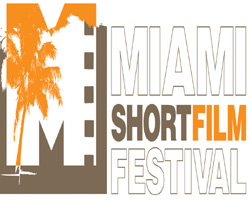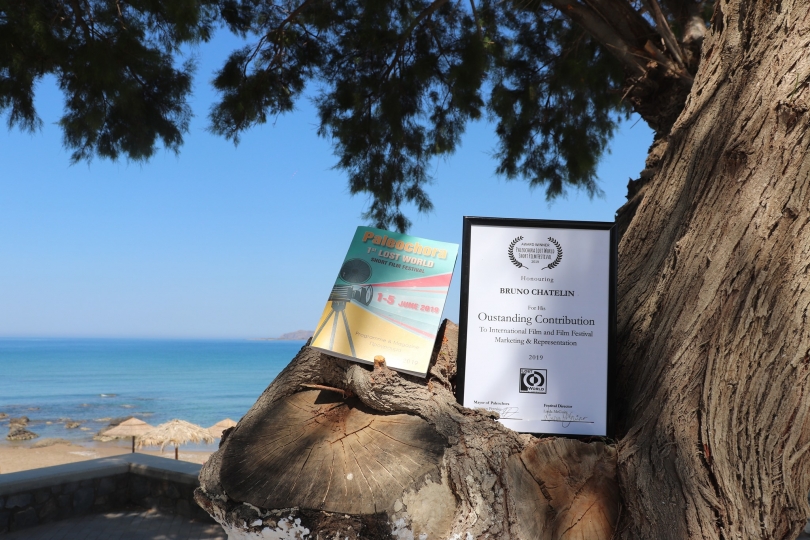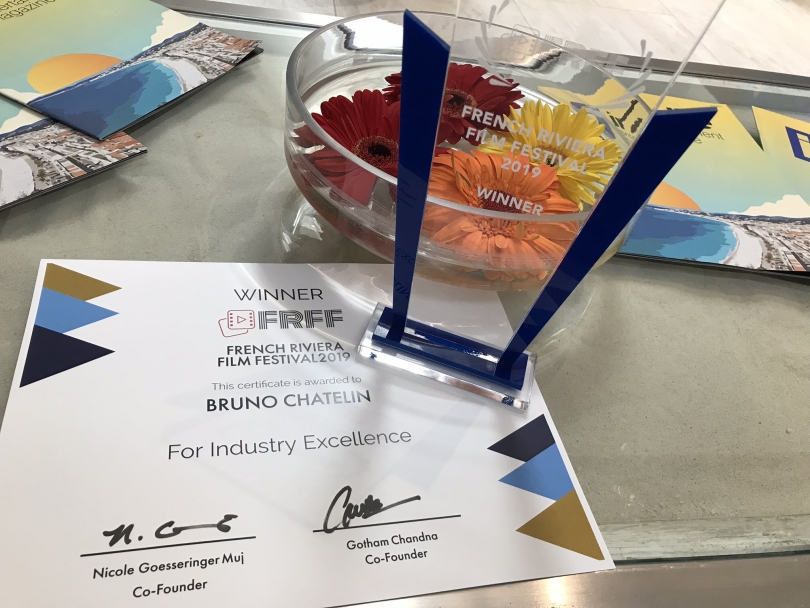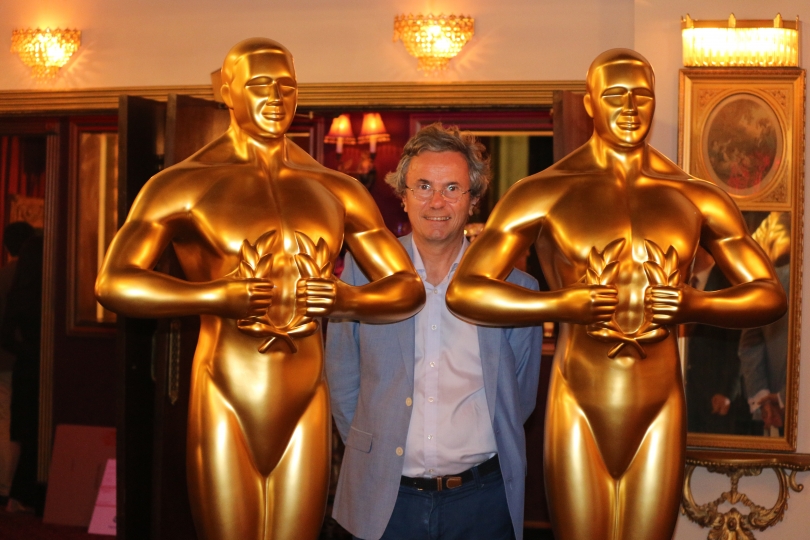VIVA PEDRO! An exclusive evening with Pedro Almodóvar, the legendary Spanish director of Women on the Verge of a Nervous Breakdown, All About My Mother, Talk to Her, and the upcoming Bad Education. Highlights from the director's rich career will be screened, followed by a conversation between Mr. Almodóvar and Richard Peña, NYFF Selection Committee Chairman. We expect onstage appearances by special guests who have appeared in Mr. Almodóvar's films.
7A Thu. Oct. 7, 6:15 pm Alice Tully Hall
HBO FILMS DIRECTORS DIALOGUES For the first time, the Festival will offer close encounters with filmmakers, extended dialogues in which audience members will get a thorough view of the directors' work and their thoughts on cinema, and will be able to ask questions and engage in conversation about all aspects of the filmmaking process.
Agnès Jaoui: The first of these two discussions features France's Agnès Jaoui, whose second directorial effort, Look at Me is the Festival's opening night film; her first feature as a director, The Taste of Others, was shown in the festival in 2000. Active both in front of and behind the camera, she has written, with partner Jean-Pierre Bacri, Alain Resnais' Smoking/No Smoking and Same Old Song, as well as Cedric Klapisch's Un air de famille, among others. As an actress, she's appeared on stage and screen for almost 20 years. Hosted by Entertainment Weekly film critic and NYFF Selection Committee member Lisa Schwarzbaum.
2E, Sat. Oct. 2, 3:00 pm
Mike Leigh: The second discussion is with Mike Leigh, a New York Film Festival veteran (his films High Hopes, Naked, Secrets and Lies, and Topsy-Turvy have all been at the Festival). Leigh turned his sights to theatrical film after more than twenty years of directing for television. Leigh is especially known for his close, collaborative working methods with actors, including Jim Broadbent, Timothy Spall, Brenda Blethyn and now, Imelda Staunton. Hosted by author, critic and NYFF Selection Committee member, Philip Lopate.
9F Sat. Oct. 9, 4pm Kaplan Penthouse in the Rose Building
MACUNAIMA (A NYFF Retrospective) Now beautifully restored to its full length and original intoxicating color, Macunaima broke box office records for the New Brazilian Cinema with its heady mix of folklore, radical politics, and irrepressible zaniness. Our hero, Macunaima, travels from the depths of the jungle to the heights of the big city, along the way meeting con artists, urban guerillas, and industrialists who like to eat people. Based on a famous modernist novel, the story was updated by director Joaquim Pedro de Andrade to reflect a country caught between a harsh military dictatorship (then in full swing) and the anarchic energy of its people. What's common to both novel and film is the portrait of a Brazil in continuous re-definition, where one moves from magical spells to modern industry in a heartbeat, where race, gender, and even one's humanity can be negotiated. A great milestone of Latin American cinema, and a whole lot of fun. 110 min. Brazil, 1969
6C Wed. Oct. 6, 8:15 pm
MILES ELECTRIC: A DIFFERENT KIND OF BLUE Miles Davis's performance before 600,000 screaming rock fans at the 1970 Isle of Wight Festival was the culmination of a remarkable journey. A giant of jazz, Davis by the late Sixties started to look in new musical directions; challenged by what he heard in the streets and on the radio - and especially by Jimi Hendrix's music - he began to add electric pianos and guitars to his ensembles, incorporating rock and funk rhythms with jazz improvisations. This fusion resulted in masterworks such as In a Silent Way and Bitches Brew; it also resulted in controversy every bit as fierce as Dylan going electric, as musicians, critics and fans argued over the future of jazz. Murray Lerner was there, and he has brilliantly captured this amazing transitional moment in American music, adding contemporary reminiscences by musicians who were at Davis's side (Chick Corea, Keith Jarrett, Dave Holland, Gary Bartz, etc.) as well as others profoundly affected by his innovations (Carlos Santana, Herbie Hancock, Joni Mitchell). Immediately following the 7:30 screening, a panel of musicians and critics will discuss the impact of Miles Davis on American music. 87 min. USA, 2004
9G Sat. Oct 9, 7:30 pm; 9H Sat. Oct. 9, 10:15 pm
UNFORGIVABLE BLACKNESS: THE RISE AND FALL OF JACK JOHNSON The first black world-heavyweight champion, Jack Johnson had a dazzling smile and an unapologetic manner that provoked white America. He revolutionized boxing with his stylish footwork, superb balance, and knockout power. During the seven years (1908-15) he reigned supreme, the boxing establishment agitated to find a Great White Hope who might unseat him (the era's openly racist expressions are shocking today). Ken Burns, celebrated for documentaries on the Civil War and jazz, has brought his considerable talent and skill to bear on a vital and irresistible subject. Rare archival images and an intricately designed sound track, featuring a haunting score by Wynton Marsalis, are exquisitely matched. The fight footage is sensational. Unforgivable Blackness is a fascinating, complex study of a magnificently gifted athlete who loved to read, party, and chase loose women (preferably white), and whose independence and dignity collided both with a racist society and his own large, self-defeating appetites. There will be a 20 minute intermission between Parts 1 & 2. 210 min. USA, 2004
10D Sun. Oct. 10 12:00 noon; 11E Mon. Oct. 11, 7:00 pm
THE INFERNAL AFFAIRS TRILOGY One of the great achievements in recent Asian cinema, Infernal Affairs has set new standards for the crime genre with its exquisite visual design and hall-of-mirrors storytelling. And yes, it's about to be re-made by Hollywood! Each film is understandable alone, but see all three for the full impact. The trilogy is co-directed by Andrew Lau and Alan Mak.
Infernal Affairs Ming (Andy Lau) is a Triad mole in the police's Criminal Intelligence Bureau. Thrown out of the police academy, Yan (Tony Leung Chiu-wai) works undercover in the criminal underworld. They are two double agents on a collision course that will leave only one man standing. (ND/NF 2003) 98 min. Hong Kong, 2002 A Miramax Films Release
10E Sun. Oct. 10, 5:00 pm
Infernal Affairs 2 Set years earlier, IA2 details how cops and criminals plant moles in each other's organizations before an impending Triad war and the return of Hong Kong to China. 119 min. Hong Kong, 2003
10F Sun. Oct. 10, 7:00 pm
Infernal Affairs 3 The mind-bending conclusion to the trilogy moves back and forth in time, as each mole (again Andy Lau and Tony Leung) comes to fear that someone is setting him up. 117 min. Hong Kong, 2004
10G Sun. Oct. 10, 9:30 pm
SELLING DEMOCRACY: FILMS OF THE MARSHALL PLAN, 1947-1955 In remarks at Harvard in 1947, Secretary of State George C. Marshall proposed that the United States must become deeply involved in the postwar recovery of Europe. Known as the Marshall Plan, this series of American-sponsored programs transformed the economic landscape of Europe and laid the groundwork for later European unity. To document and promote Marshall Plan initiatives, more than 250 films in 18 different countries were made under the auspices of the Marshall Plan Film Unit from 1948 to1955. These films included newsreels, short fictions, animations, and lyrical documentaries; some focused on a particular event or place, while others argued more generally for economic cooperation or democracy. Few films were ever screened in the U.S., as American audiences were not supposed to see "propaganda" paid for by their own tax dollars. These five programs represent the first major American presentation of this unique and timely body of work. Curated by Sandra Schulberg and Richard Peña.
Program One: A New Deal For Europe: Me and Mr. Marshall, 16mm; The Shoemaker and the Hatter, 16mm; Story of Koula, 16mm; Your $80, 16mm; Whitsun Holiday, 35mm
A young German coal miner recounts the personal impact the Marshall Plan has had on his life in Me and Mr. Marshall (1949, Office of the Military Government of the US); the film also features footage of Secretary Marshall talking about Europe. Two tradesmen argue about the best financial strategy after the war in the delightful animation The Shoemaker and the Hatter (1950, John Halas & Joy Batchelor), released across Europe in eleven languages. The Story of Koula (1950, Vittorio Gallo) follows the friendship between a boy and a very big mule, one of many shipped to Greece under the European Recovery Program (ERP). Made at the height of the Cold War, Your Eighty Dollars (1952, MSA Film Section) details the strategic role of the Marshall Plan in the European effort to resist Communism. Outright propaganda saved by wit, Whitsun Holiday contrasts Europeans enjoying a springtime vacation with their counterparts grimly participating in a "World Youth Congress" in Communist East Berlin. 91 min.
Buy tickets online at lincolncenter.org
11A Mon. Oct. 11 12:30 pm Alice Tully Hall
Program Two: Spotlight On Germany/Austria: It’s Up to You, 16mm; Between East and West, 16mm; The Marshall Plan at Work in West Germany, 16mm; City Out of Darkness, 16mm; The Invisible Link, 16mm
The reconstruction of Germany was vitally important not only because of its economic significance but also to prove that America's war was against the Nazis, not the German people. Films include a sketch of the rise of the Nazi Party (It's Up to You) and reports on the restoration of electric power in Berlin (City Out of Darkness). 85 min.
Buy tickets online at lincolncenter.org
14C Thu. Oct. 14, 3:00 pm; 14E Thu. Oct. 14, 7:15 pm
Program Three: Spotlight On Italy/France: Aquila, digital beta; The Struggle for Men’s Minds, digital beta; The Other Paris, digital beta; The Home We Love, digital beta; Town Without Water, digital beta
Marshall Plan films geared toward Italian and French audiences were often ideological in nature, urging both nations to reject Communism and embrace a close alliance with the U.S. Films include Aquila, a post-Marshall Plan remake of The Bicycle Thief (with a happy ending) as well as a look at unionization of labor in France (The Other Paris) 105 min
Buy tickets online at lincolncenter.org
14D Thu. Oct. 14, 5:00 pm; 14F Thu. Oct. 14, 9:15 pm
Program Four: By Land And Sea: Houen Zo, 35mm; Island of Faith, 16mm; Breakthrough, 16mm; The Living Stream, 16mm; Free City, 16mm.
Some of the most effective Marshall Plan films couched their messages in simple portraits of people struggling to re-build their lives and livelihoods. Films include Island of Faith, a moving celebration of one Dutch island's efforts to reclaim land from the sea, and award-winning filmmaker Arne Sucksdorff's visual poem on Scandinavian economic cooperation, The Living Stream. 88 min.
Buy tickets online at lincolncenter.org
15C Fri. Oct 15, 3:00 pm; 15E Fri. Oct. 15, 7:30 pm
Program Five: Strength For The Free World-From War To European Union Hunger, digital beta; The Smiths and the Robertsons, digital beta; Hour of Choice, 35mm; Without Fear, digital beta; Let’s Be Childish, digital beta
Increasingly, Marshall Plan films became seen as instruments in the Cold War with the Soviet Union and Communism. Films include The Hour of Choice, encouraging intra-European cooperation as the best defense against the Soviets, and Without Fear, a beautiful Technicolor animation that offers a stark portrait of the choices the continent faces. 93 min.
Buy tickets online at lincolncenter.org
15D Fri. Oct. 15, 5:00 pm; 15F Fri. Oct. 15, 9:30 pm
THE NEW YORK FILM FESTIVAL PRESENTS, IN ASSOCIATION WITH THE GOETHE INSTITUT, A SYMPOSIUM ON THE MARSHALL PLAN
In conjunction with the Selling Democracy retrospective of 25 Marshall Plan and OMGUS films at the New York Film Festival, The German Marshall Fund of the United States is sponsoring a Marshall Plan Symposium, hosted by the Goethe Institut on Saturday, October 16, from 2:30 - 6:00 pm, at the Institute, 1014 Fifth Avenue (across from the Metropolitan Museum). The Symposium is presented in association with the Council for European Studies and the Institute for European Studies, both based at Columbia University. The Symposium is open to students, teachers, and the general public. Admission is free.
Distinguished European and American scholars Volker Berghahn (Columbia University), David Ellwood (University of Bologna), Rainer Rother (Deutsches Historisches Museum), and Elizabeth Heffelfinger will speak about the Marshall Plan's place in history and its relevance today. The discussion will be moderated by John Glenn, Director of Foreign Policy for the German Marshall Fund and author of Framing Democracy. The German Marshall Fund of the United States (GMF) is an American grantmaking and public policy institution founded in 1972 through a gift from Germany in honor of post-war Marshall Plan assistance. GMF's mission is to promote the exchange of ideas and cooperation between the United States and Europe in the spirit of the Marshall Plan. GMF gives grants for the study of international and domestic policies, sponsors fellowships that support comparative research and foster debate, and promotes information sharing that strengthens broad understanding of transatlantic issues and perspectives. In addition to its headquarters in Washington, DC, GMF has offices in Belgrade, Berlin, Bratislava, Brussels, and Paris.
Symposium scholars will discuss the goals and historical impact of the European Recovery Program from three aspects - economic, political, and educational. Presentations will elucidate how the Plan aided the re-birth and consolidation of liberal democracy in western Europe, giving rise to the European Payments Union (1951), the European Coal and Steel Community (1952), the Organization for Economic Cooperation and Development (OECD), NATO (North Atlantic Treaty Organization), the Council of Europe, and ultimately the European Union. Speakers will also address how the Cold War changed the initial strategy of the Marshall Plan as reflected in the films made under the earlier and later phases of the Marshall Plan, i.e. ECA (Economic Cooperation Administration) films versus MSA (Mutual Security Administration) films.
BIOGRAPHIES OF SYMPOSIUM PARTICIPANTS
Volker Berghahn
Volker Berghahn has been the Seth Low Professor of History at Columbia University since 1998. He received an M.A. from the University of North Carolina at Chapel Hill and a PhD from the University of London in Britain, where he subsequently taught at the University of East Anglia and Warwick University. In 1988 he moved to Brown University where he held the John P. Birkelund Chair in European History. Professor Berghahn is the author of some 15 books on modern German history and on European-American relations, among them: The Americanization of West German Industry, 1945-1973 (Cambridge University Press, 1986) and America and the Intellectual Cold Wars in Europe (Princeton University Press, 2001). His current research topic is American big business perceptions of the German industrial system in the 20th century.
David Ellwood
The author of Rebuilding Europe: Western Europe, America and Postwar Reconstruction (Longmans, 1992) and Italy 1943-1945: The Politics of Liberation (Leicester University Press, 1985), David Ellwood is Associate Professor in International History, University of Bologna, Italy, and Lecturer in European-American relations at Johns Hopkins University's Bologna Center. His major themes are the working of American power in contemporary European history, U.S. and European integration, Americanization and anti-Americanism, and the Anglo-American relationship. His study of the European Recovery Program's public information and film activities led him to issues of cultural power, particularly that of the American cinema industry, and resulted in two books on Hollywood in Europe (Florence 1991, Amsterdam 1995), which he edited. Professor Ellwood is currently at work on a new book, America and the Politics of Modernization in Europe, for Oxford University Press. From 1995-1999, he served as President of the International Association for Media and History (IAMHIST).
Elizabeth Heffelfinger
Elizabeth Heffelfinger is a postdoctoral fellow in the Literary and Cultural Studies Program at Carnegie Mellon University. Dr. Heffelfinger researches and teaches film theory and film history, cultural studies and popular culture of the twentieth-century. Her dissertation, "Black Marketers and Other Bad Actors: Narratives of Economic Citizenship in American Film, 1945-1955" examines reconversion narratives - film narratives that came to define the emerging economic, political and cultural sensibilities of postwar culture.
Dr. Rainer Rother
Since 1991, film historian Dr. Rainer Rother has served as Director of the Film Center at Berlin's German Historical Museum (Leiter der
Kinemathek des Deutschen Historischen Museums - DHM). Previously he taught at the Universities of Hannover, Saarbruecken, and Hildesheim. He received his M.A. and doctorate at the University of Hannover. At the DHM, his exhibitions include The Last Days of Mankind: Images of World War I (1994); World War I: Reality and Remembrance (2004); Empire of Imagery: The UFA Studio 1917-1945 (1992); The Path of the German People, 1949-1999: Unity and Freedom. He also edited the accompanying catalogues. He co- curated (with Sandra Schulberg) Selling Democracy: Films of the Marshall Plan 1947-1955 for the Berlin International Film Festival (2004). His books include Leni Riefenstahl: The Seduction of Genius (2002) and Die Gegenwart des Geschichte: Ein Versuch über Film und zeitgenoessische Literatur (1990); he is the Editor of Sachwoerterbuch Film (1997); Mythen der Nationen: Voelker im Film (1998); Bilder erzaehlen Geschichte: Der Historiker im Kino (1991). Dr. Rother is a frequent contributor to the newspapers Frankfurter Allgemeine Zeitung, Die Welt, Frankfurter Rundschau, Berliner Zeitung, and to the magazines Merkur, Freibeuter, Filmdienst, as well as to other books and encyclopedias. Since 1998, he has served as Secetary General of the International Association for Media and History (IAMHIST).
John K. Glenn, Moderator
John K. Glenn, PhD, is Director of Foreign Policy for the German Marshall Fund of the United States. He served as Executive Director of the Council for European Studies from 2000-04, and is the author of Framing Democracy (Stanford University Press, 2001) and co-editor with Sarah Mendelson of The Power and Limits of NGOs (Columbia University Press, 2003).

 Chatelin Bruno
Chatelin Bruno 














